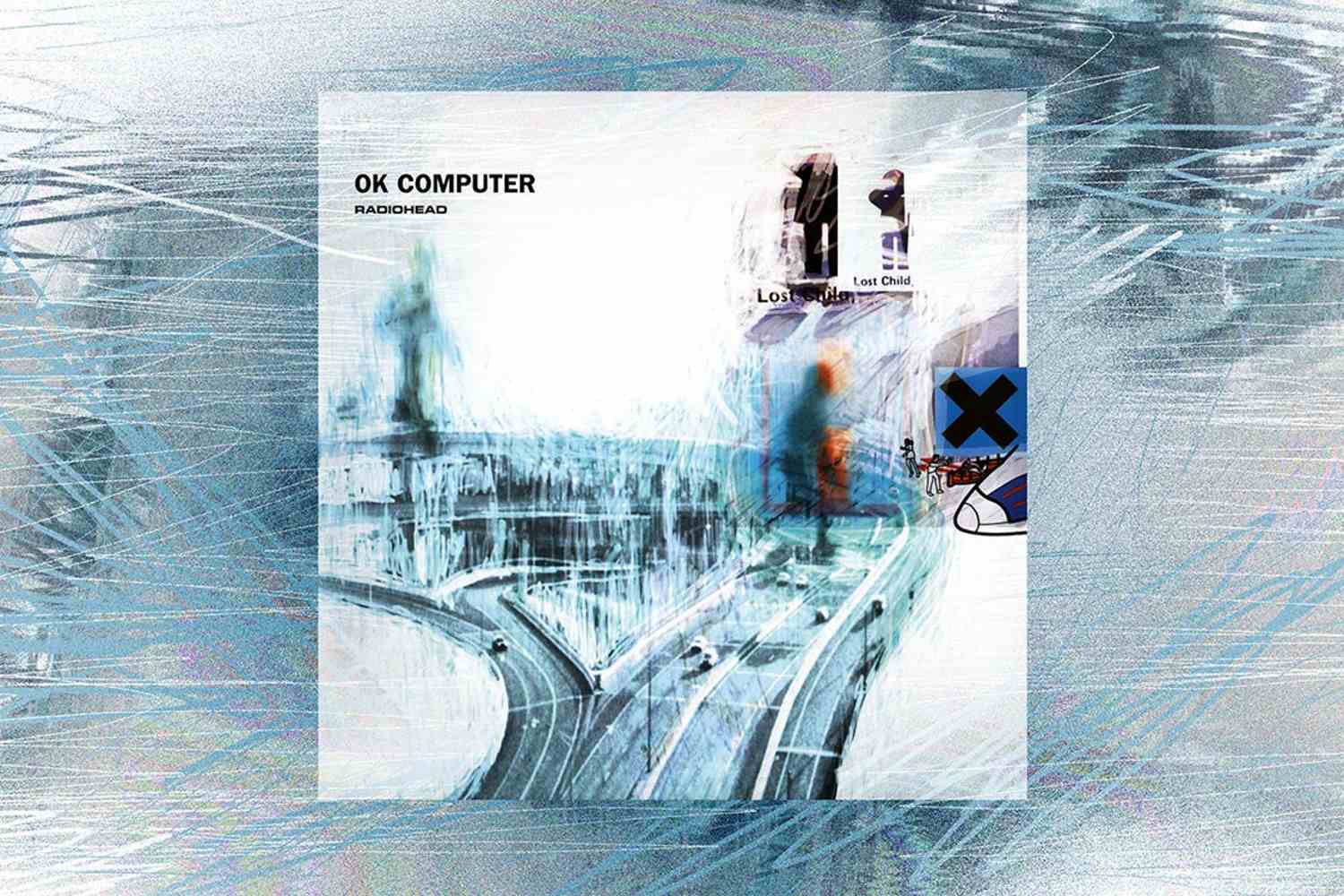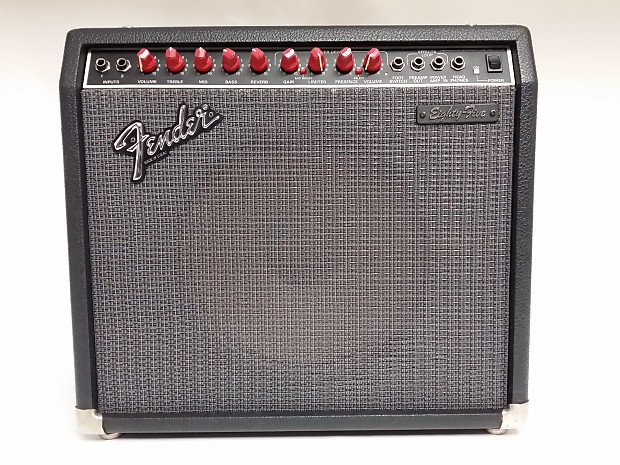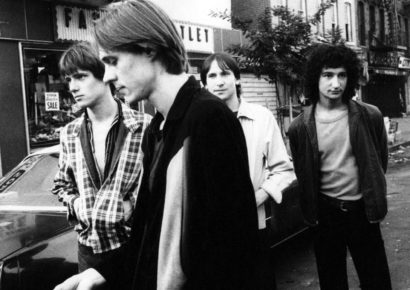We take a look at the gear behind the '90s favourite - Radiohead's OK Computer.
More than 20 years after its release, OK Computer stands as a landmark moment in the history of contemporary music, combining technological innovation with intense feelings of isolation and despair to perfectly bookend one of the most tumultuous decades of the century.
Radiohead OK Computer
Fusing electronic elements with the band’s pre-existing alt-rock sound, OK Computer showed a glimpse of just how much of an impact Radiohead would have on the music industry, with producer Nigel Godrich capturing the band’s collective prowess and individual talents in a way unmatched by other producers.
Read up on all the latest features and columns here.
As well as being a cultural milestone, OK Computer plays host to some of the finest instrumental work performed by Radiohead across their entire career.
To celebrate the album, we take a look at the huge lot of gear used to create OK Computer.
1991 Fender Telecaster Plus
Favoured by Jonny Greenwood as his main guitar for close to 25 years, this Fender Telecaster Plus is frequently heard across OK Computer, and includes several modifications to help Greenwood achieve his signature unconventional sounds. While the guitar features its original Lace Sensor pickups, Radiohead’s guitar tech Plank added a kill-switch near the control knobs of the guitar, allowing Greenwood to create the stuttering effect heard in the solo of ‘Paranoid Android’. The guitar also features the slightly bizarre addition of a ball-end of a guitar string poking out of the pickguard, which was apparently present around the recording of OK Computer for Greenwood to hook his E string on to play high pitch, ghost notes otherwise inaudible on a traditional fretboard.
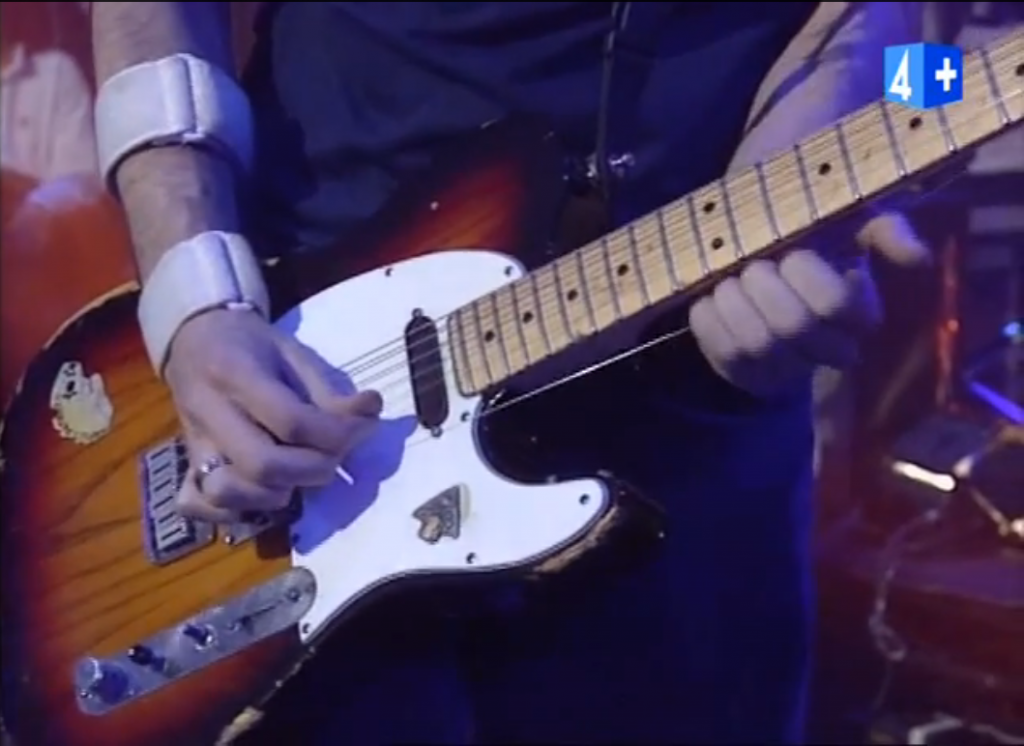
1975 Fender Starcaster
A relatively obscure ’70s creation from Fender, Greenwood purchased his 1975 Starcaster immediately prior to the recording of OK Computer, and uses it on the album’s more mellow tracks including ‘Subterranean Homesick Alien,’ ‘Let Down,’ and album closer ‘The Tourist.’ Greenwood typically uses this live for Radiohead material written between 1995-2001, including ‘Pyramid Song,’ where he plays the guitar with a violin bow.
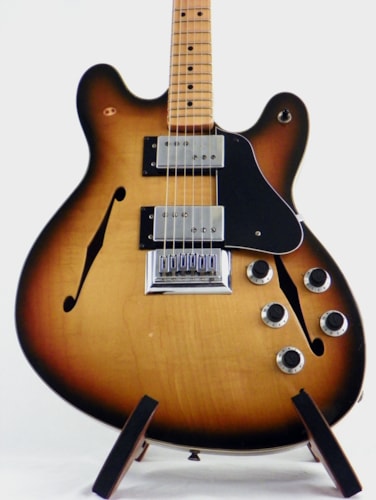
Rickenbacker 360
A personal favourite of Ed O’Brien’s, this Fireglo Rickenbacker 360 was picked up to replace a natural 360 stolen along with the rest of the band’s gear in 1995, and was used by O’Brien to record almost every song on OK Computer. O’Brien also tends to use this guitar when playing OK Computer tracks live, particularly ‘Exit Music (For A Film),’ ‘Electioneering,’ and ‘No Surprises.’
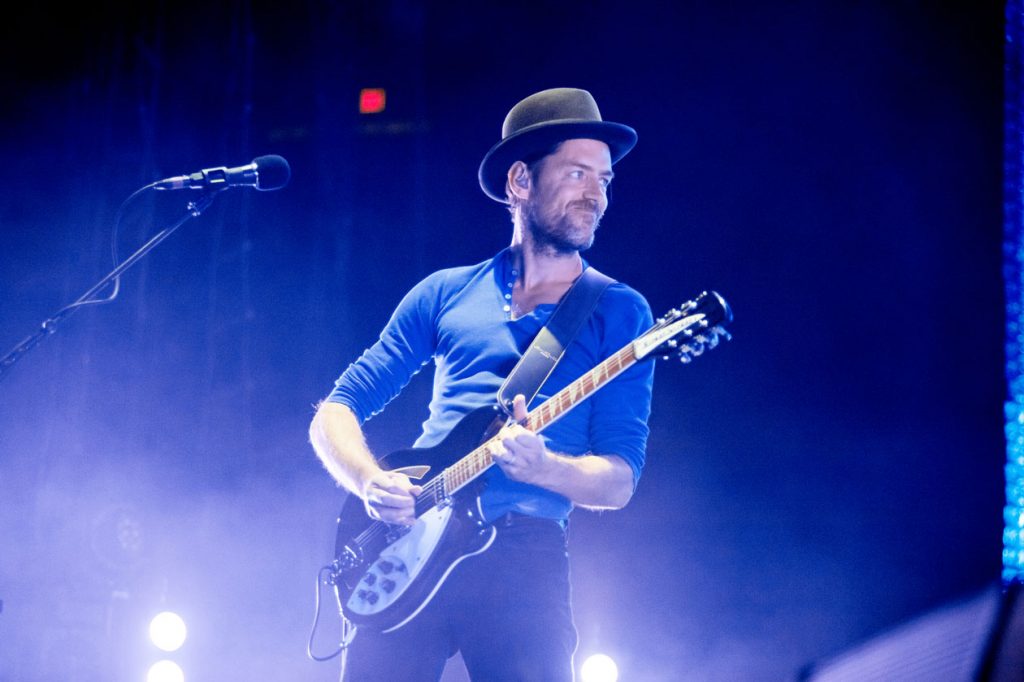
Fender Eric Clapton Signature Telecaster
O’Brien notoriously used a heavily modified Eric Clapton Signature Stratocaster with a whole heap of reverb and modulation effects throughout ‘Lucky,’ in which he strums behind the nut to make the unsettling, discordant sounds heard at the start of the track. O’Brien later further modified the guitar to include a Fernandes Sustainer system, which later proved to be the basis of his new signature Fender EOB Sustainer Strat.
Fender Telecaster Deluxe
Thom Yorke actually bought two of these prior to the recording of OK Computer – a sunburst Telecaster Custom and a black Deluxe model – both of which sport a vintage rainbow Apple sticker behind the bridge. Yorke removed all but one of the knobs on his black Telecaster, and later converted his sunburst Custom into a deluxe by adding a Wide Range Humbucker to the bridge position. Both of these guitars received heavy use in the studio and on tour for the album.
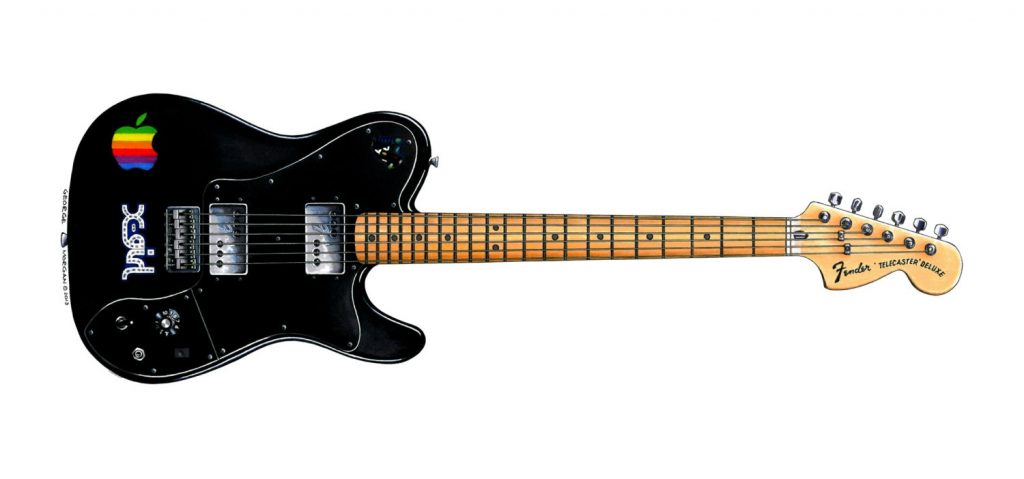
Fender Jazzmaster
Around the recording of OK Computer, Yorke also acquired his first Fender Jazzmaster, a 1963 black model with a few modifications to the switching to make it more reliable on stage. This guitar can be distinctively heard being played by Yorke on ‘Lucky’ and ‘Airbag.’
Yairi DY-88
While it’s uncertain whether this guitar was used to record the acoustic parts on the album, Yorke frequented a Yairi DY-88 for almost every live performance throughout the OK Computer tour, particularly for tracks ‘Karma Police,’ ‘Climbing Up The Walls,’ and ‘Paranoid Android.’
Fender Precision Bass
Colin Greenwood has been a longstanding P-Bass aficionado for the majority of his career, primarily playing a cream coloured ’70s model with a tortoiseshell pickguard he obtained in a trade around 1996. However, he actually recorded the majority of OK Computer with a different Sunburst model, which looks like a ’70s reissue, fitted with a black pickguard and later seen with a sticker claiming ‘Col’s A Cracker’.
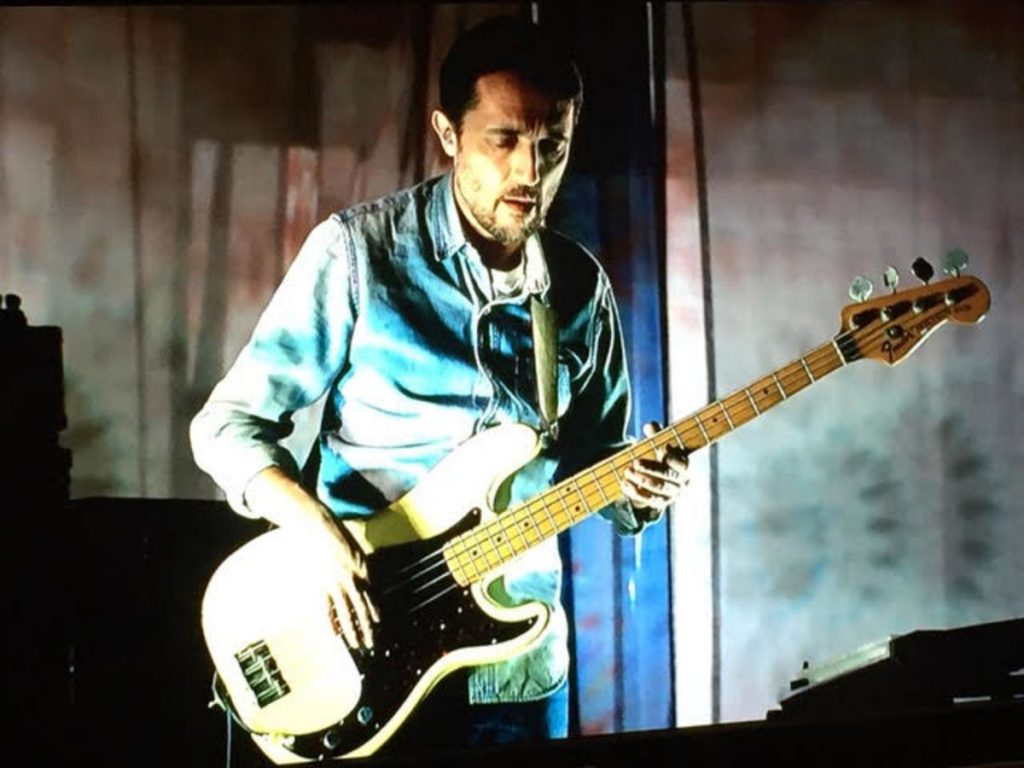
Drums
Radiohead Premier drumkit
According to this auction lot, Phil Selway’s kit for the recording of OK Computer was a cherry red Premier kit with a 20-inch bass drum, a 10-inch rack tom, a 12-inch rack tom, a 14-inch floor tom, a 14-inch snare drum, and four cymbals. In the above image, you can spot Radiohead’s signatures on the floor tom of the kit.
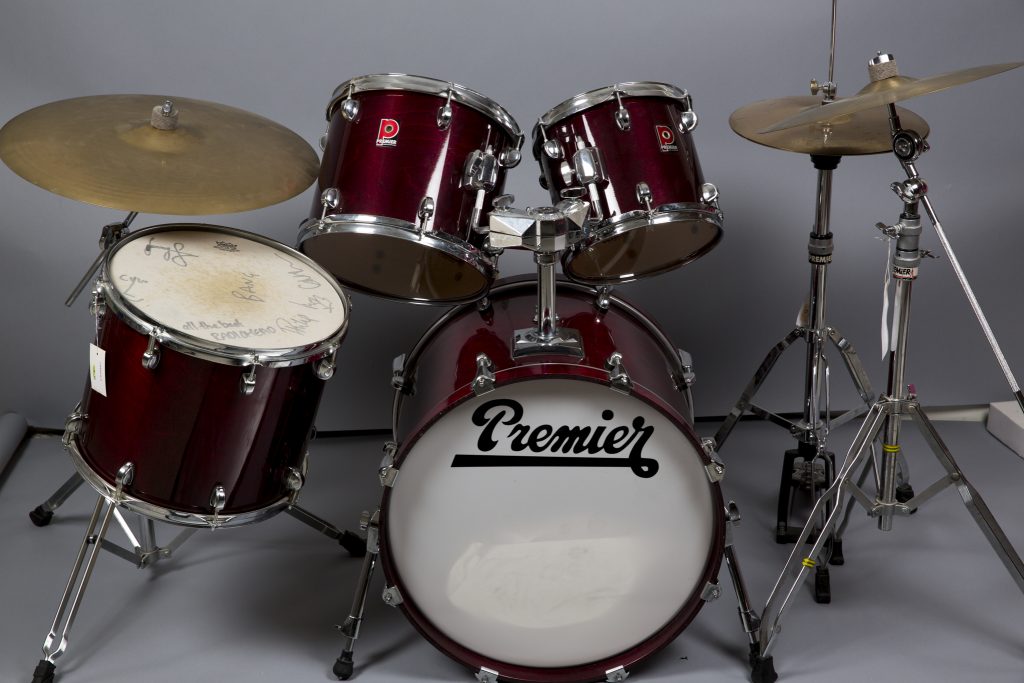
Vox AC30
Throughout the making of OK Computer, Radiohead tended to rely upon the same amps used for live shows around this era. Yorke recorded his guitar parts through a Fender Twin Reverb, while O’Brien and Jonny Greenwood both used a Vox AC30 for clean tones.
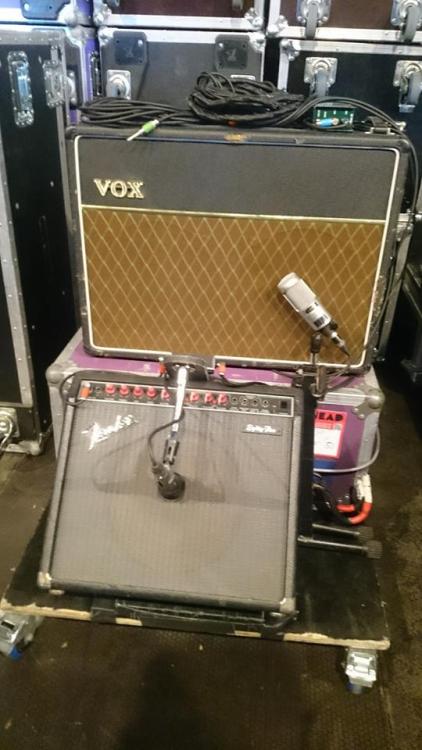
Fender Eighty-Five
For distorted tones, Jonny Greenwood utilised his longtime solid state Fender 85, while O’Brien used a Mesa Boogie Dual Rectifier Trem-O-Verb.
For bass, Colin Greenwood heavily relied upon his Gallien-Krueger 800rb Head paired with an Ampeg SVT 8×10 cabinet, as well as using a vintage Ampeg GV22 combo for some distorted sounds.
Keyboards
Fender Rhodes MK 173
Inspired by the use of the instrument on Miles Davis’ seminal jazz record Bitches Brew, Radiohead sought to incorporate the electric piano sound of the Fender Rhodes into OK Computer. The classic keyboard can be heard on a variety of tracks including ‘Let Down’ and ‘Subterannean Homesick Alien.’
Mellotron M400
Greenwood also used the archaic Mellotron M400 to record the haunting choir part of ‘Exit Music (For A Film)’.
Effects
Mutronics Mutator
This wild, synth-like rack effects unit was specifically used by Jonny Greenwood to create the warped, filter-sweeping guitar solo at the end of ‘Paranoid Android.’ The Mutator has also been a staple in Daft Punk’s rack ensemble, and is hotly sought after by gear enthusiasts today.
AMS DMX 15-80S Digital Delay
Now discontinued, the DMX 15-80S delay can be heard at the very end of ‘Karma Police’ where O’Brien manipulates the feedback to create an insane, swirling sound – slightly reminiscent of Yorke’s complaints about his buzzing refrigerator. O’Brien can be seen twiddling the unit in the band’s performance of ‘Karma Police’ on David Letterman.
Shin-Ei Fuzz FY 2
It’s hard to single out one pedal as being the best in a band like Radiohead; however, there’s one definite standout pedal moment on OK Computer: Colin Greenwood’s bass playing in ‘Exit Music (For A Film).’ The song’s descent into ‘fuzzed out’ comes courtesy of a Shin Ei Companion Fuzz FY 2, which Greenwood picked up in a pawn shop for $60 back in 1996. The song is also well known for its role in the final sequence of Baz Luhrmann’s ’90s cult classic Romeo + Juliet.
Fred
One of OK Computer’s bleakest moments, the spoken interlude of ‘Fitter Happier’, was achieved by Yorke typing a set of dystopian phrases into Apple’s SimpleText feature, using the ‘Fred’ voice to have the computer recite the anxiety-inducing lyrics in the most emotionless way possible. Speaking to Select in 1997, Yorke gave an explanation as to why the voice appears on the record. “The others were downstairs, ‘rockin, and I crept upstairs and did this in 10 minutes,” Yorke said. “I was feeling incredible hysteria and panic, and it was so liberating to give the lyrics to this neutral-sounding computer.”
For more Radiohead content, check out their immersive free digital archive.
